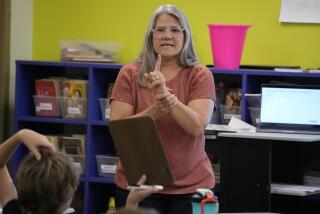Whiz Kids Believe Calculator Use Could Add Up to a Bad Mistake for Young Students
- Share via
WASHINGTON — The California Department of Education ruled last year that “before the end of the sixth grade, students should have calculators continuously available for use--in class, on homework assignments and on tests.”
The question, “Is this a good idea and will it stimulate math learning?” was posed to the 40 national winners in the 46th annual Westinghouse Science Talent Search. The students, who are completing high school and range in age from 15 to 18, met here recently to receive $140,000 in scholarships and cash awards for their independent research studies in the sciences and mathematics.
The Search has been administered by Science Service, a nonprofit organization, paid for by the Westinghouse Electric Corp. since 1942.
With winning projects often compared to those undertaken at master degree levels, the opinions expressed are obviously not the same as those of the average high school adolescent.
‘Lifetime Crutch’
Sixty percent of the 1987 Westinghouse winners clearly vetoed calculator use by pre-teens. While some predicted that such early use would transform the calculator from a “valuable tool” to a “lifetime crutch,” others cited potential intellectual, academic and psychological damage to the student.
Underdeveloped brainpower concerned the third-place $15,000 scholarship winner, Albert Jun-Wei Wong, 16, of Oak Ridge, Tenn., who said: “In sixth grade, students are still developing their minds. If only for the sake of forcing them to use their brainpower, calculators should not be a necessity. There is also the danger of using a calculator without knowing the why and how of its function.”
Albert’s Search project dealt with biological cybernetics. He believes his investigation may provide further insights into the brain’s complexities. First in his class at Oak Ridge High, he has received first-place honors for science and mathematics and recognition for his abilities in French, music and soccer. He hopes to attend Princeton University and prepare for a career as a physicist or mathematician.
Loss of potential student capability and self-esteem were cited by Jessica Lynn Jacobson, l8, who lives in Orinda, Contra Costa County, and attends Miramonte High School.
“If students are always allowed to use calculators, they will never learn basic arithmetic--adding, subtracting, multiplying and dividing,” she said. “They will never be confident without checking their answers with a calculator.”
For her project, Jessica studied a type of freshwater crustacean.
Career in Medicine
The recipient of many science awards, including a first place in the 1986 International Science and Engineering Fair, Jessica is planning a career either in medicine or biomedical engineering. Scuba diving and snorkeling are her favorite activities.
“At the sixth-grade age, students are not doing such complex work that they need calculators to ease the number-crunching,” said Andrew Heafitz, 17, of Newton, Mass., a senior at Newton South High School. “Number-crunching is what they are learning. To use calculators at such an early age produces calculator-dependent invalids.”
The first-place winner in the Massachusetts State Science Fair and the Navy National Science Award Program, Andrew developed a rocket-launched motor-driven aerial photography system for his project. Skiing, astronomy and carpentry are among his hobbies. At college, he plans to study mechanical engineering.
Unhealthy student attitudes about mathematics and lower standards are consequences foreseen by Elizabeth Lee Wilmer. At Stuyvesant High School in New York City, the 16-year-old senior is captain of her school’s math team but always finds time for cross-country running, bicycling and extensive reading.
Elizabeth received the second-place $15,000 scholarship for a mathematics project relating to three-color theorems and hopes to attend Harvard University to prepare for a career as a mathematician.
Bad Attitude
“Spend five years teaching the kid arithmetic and then tell him or her, ‘Hey, all that was really useless and you don’t need it anyway.’ That’s sure to develop a great attitude toward math,” she said.
On the other hand, the 22% who favor calculator use by pre-teens and the 18% who were uncertain aren’t convinced that most students will react that way. They believe that calculator use at an early age will benefit all students in the long run and may even inspire more students to enjoy math.
Louise Chang, 17, of Westmont, Ill., approves for another reason. “Calculators make it easier for instructors to construct problems and increase the amount of material which can be covered in a given amount of class, testing or homework time,” she said.
She does favor “some testing to be conducted without calculators to ensure students remember basic arithmetic.”
Louise was the recipient of the first-place $20,000 scholarship for a cancer research project in which she isolated three genes that are more active in cancerous cells than in normal cells. A senior at the University of Chicago Laboratory Schools High School, she was chosen from area schools as the outstanding young scientist of 1986 by the Chicago Museum of Science and Industry.
An accomplished violinist, Louise plays with the University of Chicago Symphony Orchestra and enjoys jogging, sewing and gymnastics. After studies at either Harvard or the University of Chicago, she plans to do cancer research.
More to Read
Sign up for Essential California
The most important California stories and recommendations in your inbox every morning.
You may occasionally receive promotional content from the Los Angeles Times.













